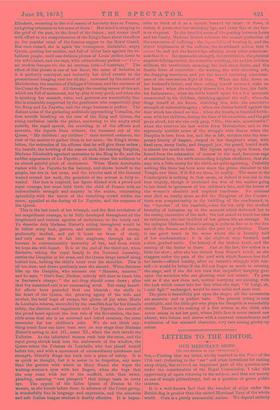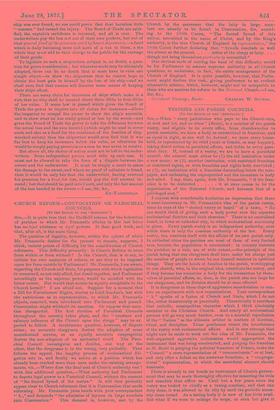LETTERS TO THE EDITOR.
OUR MERCHANT SHIPS.
[TO THE EDITOR OF THE "SPECTATOR.] Sin,—Finding that my letter, kindly inserted in the Times of the- 17th inst. (referring to the " rat " and other inventions for casting away ships), has revived an important part of the question now under the consideration of the Royal Commission, I take this opportunity of again referring to the subject, and that not merely as one of simple philanthropy, but as a question of grave public interest.
It is a well-known fact that the number of ships under the British flag is greater than the united Merchant Navy of the whole world. Ours is a purely commercial nation. We depend entirely upon our ships for bringing our supplies of raw material and for conveying our produce to foreign parts; and our whole nation depends upon that commerce of which they are the foundation. Is it, therefore, exaggeration to say that anything which affects our Merchant Navy acts upon the very root of our prosperity ?
During the last half-century science has made rapid strides. Dangers of navigation unknown (at least until too dearly dis- covered) by our fathers are now marked down with the utmost minuteness on our charts. Dangerous shoals have been buoyed Dangerous coasts have been lighted. Our captains and sailors (many of whom in those days could neither read nor write) have now been instructed in the use of instruments then not even invented. The captain about to sail from port may now at any moment inform himself of the exact force and direction of the sea and wind at that very hour, in almost every part of the world. That same mysterious electric current he once feared is now taught to be his friend, and bring him tidings of the distant storm, that he may prepare for its coming, yet; despite all this, the fact, the stubborn fact, remains, that whereas even ten years since, in some cases, five per cent. was found to cover a year's risk, now in those same trades ships are paying eight and nine per cent., and that with less gain to the underwriter.
If the sea has become impatient, and determined to resent the increased intrusion upon its bosom, then all our arts would be of
no avail, and all legislation on the subject, however learned, pro-
found, or stringent, would be equally impotent. But we have data on which to form a very different conclusion. There are ship
owners whose losses for years have not averaged two per cent. per annum, and it is clear that this is not simply due to a caprice of good fortune, but is the result of their own praiseworthy efforts to keep their ships "tight, staunch, and strong, and in every way fitted for their respective voyages ; " whereas we have, on the other hand, a number (and unfortunately a far greater number) whose losses exceed ten per cent. in the same period. This is no more due to fatality ; it is purely and simply the result of acts which graduate from simple ignorance down to actual crime.
We are asked, why do not the underwriters take up the subject? Surely they are strong enough, and those whose pockets are affected are always the best to find a remedy. In this I cordially concur.
Those who really suffer or share the loss are the most interested, and it is for them to bestir themselves in the matter. But I wish to show that those who really bear the loss are not the under- writers at all, but the careful, prudent, and honest shipowner, and after him, the public at large ; and it is these I wish to interest.
Now, a few years since, a very valuable steamer was wrecked upon a dangerous rock, and I endeavoured to obtain a contract from the Government for the removal of the danger. As it was a somewhat stupendous work, I wished to obtain all the support I could command, and first went to a friend, the director of one of the insurance companies, which had lost most by the wreck. His reply was this :—" As an underwriter, I do not see how we are interested. That rock is well known, and forms one of the dangers which takes a part (although, perhaps, a very minute part) in our calculation. If the average number of losses in any particular trade is reduced, competition obliges us to reduce our premiums.
We know there are dangerous winds in the Indian Ocean and coral reefs in the Red Sea. If you can find some mode of counter- acting those dangers, you will save many lives and much property, you will deserve the thanks of the sailors, but we shall simply re- duce our premiums." This was not the opinion of one only, but of all. A few years since there was a great effort made to prevent timber-laden ships in the North American trade from taking deck-loads in the winter. Now, as soon as the order was given, the premiums were reduced upon the winter voyages to nearly half what they were before ; one of the dangers of that trade was reduced, and the underwriters followed suit. After a time the order was withdrawn. Some ships again took deck-loads, and the others were obliged to do the same. The underwriters were at once alive to the increase of danger, and again raised the rates to the former standard. The consequence was this, that a prudent shipowner who had a ship in that trade, and wished to cover
her with a time policy, had to pay the advanced premium,- i.e., had to help to cover the risk incurred by those who made more profit out of their ships than he could with safety. Of course, by giving a warranty that his ship should never carry a deck-load in winter, he obtained some slightly better terms, but not such as when no ship could do so. The whole trade had be- come more dangerous, and the underwriters did not care about inquiring into the special claims of some honest and prudent ship- owner who simply desired to cover a fair sum in case of a bone' fide oas,—one who took a real interest in the safety of his ship. This is only one of the trades in which the acts of a few avari- cious owners, who take more interest in the loss than the safety of their ships, bring discredit upon the whole trade. And while they are reaping a harvest by overloading their ships and driving them, when a cautious or uninsured owner would keep them in port, the prudent owner is struggling to earn, with safety to his ship, a fair per-centage. He not only carries less than his rival, pays higher wages to his captain, and obtains a better crew, but actually has, by the premiums he pays, to help to cover not only his own fair risk, but the risk incurred by the ruinous opposition of his rival.
But there are another class of shipowners who just manage to keep within the pale of the law, whose ships never die "in their beds," but are always kept at work until they succumb to what may be termed "actual exhaustion," and take their last load to the bottom. This class is divided into numerous sections ; the first carry on their trade thus. They purchase ships which have about two or three years to run in their original class, obtain a time insurance of, say, one year ; they then set to work, and strain every nerve of the ship, run her without rest, load her to the utmost extent of her powers of buoyancy, and only give her such few and slight repairs and extra stores as are absolutely necessary. If she outlives the first year, then the underwriters, who have had no claims from her, are always ready to renew the insurance for the same amount. In the end she goes down. At the time of her loss, she would not be worth perhaps more than half what she cost ; but there is nothing to act upon ; the under- writers may know that the loss was a boon to the owner, but it was legal, and they would only be laying themselves open to a charge of taking premium, and then endeavouring to get out of the obligation for which that premium was paid, were they even to try and resist the claim.
The next class are those whose ships have become so far gone from neglect and over-work that to repair them would cost more than their value afterwards, or ships in which " dry-rot " or some other fatal disease has been discovered ; these ships have usually been fortunate, have kept up their insurance year after year, and are still in good repute. The owner is, doubtless, one who would scorn to commit an act which might bring him before a criminal tribunal,—besides, there is no need to do so ; he loads the ship with some trying cargo, puts on board a captain who has been unfor- tunate before, ships a crew of third-rate sailors who have doubtless no warm clothing among them, and then sends his ship to some northern port ; a little hint to the captain which could never be turned against him, and the ship is not likely ever again to require the services of carpenters or a berth in a dry dock.
It may be asked, how is it that sailors are found to go in these ships ? That is easily answered. First, the English sailor is about the most reckless man to be found anywhere ; secondly, except in the case of some of the first-class sailors, the man signs articles, and never sees the ship until she is ready to start, and he has got on board at the last moment, doubtlessly still under the influence of a long spree ashore. A bullying captain knows how to manage such a crew ; he sets them all to work. They are strangers to each other, there is no time for a consultation, each thinks perhaps he is the only one dissatisfied, and fears that if he should rebel and be the only one to leave the ship he would most likely get six weeks' imprisonment, and he " takes his chance" and remains.
But there is a third section, and these are the more daring, who not only run "the dangers of the sea and land," but those of the law also. In these cases the master usually has some considerable interest at stake. The ship is to go upon her last voyage, and some of the many contrivances are adopted. The ship must leave without any suspicion. She must therefore be inspected. All is to be fair and above-board, eo the most respectable crew is engaged. The officers are also men whose word will go a long way, but a " rat " has got on board. The captain knows it will lie still until a certain day, and he takes his course accordingly. At the appointed time it is reported that the ship has "sprung a leak" in the main hold, just along side of the keelson ; no one could have got down there, no one can now go down to stop it, as it is under tons of cargo. A sail cannot be got down over the side, for its position alongside of the keel would prevent it from sucking,— " a trenail must have got loose or been left out." There is no help for it but to pump. The captain is foremost in encouraging his men, but the ship is far from any port, the pumps are not very powerful, the water gains ; they at last find a chance of abandoning her. The sailors and officers are really honest men, and they give their account with a clear conscience, and show that they did their best. The captain leaves the ship without fear ; he knows that the " rat " in doing its work has left no tale behind it even if the
ship was ever found, no one could prove that that harmless little coacern" had caused the injury. The Board of Trade are satis- fied, the captain's certificate is returned, and all is over. The 'underwriters pay the loss not out of their own pockets, but out of that general fund of the premiums paid by honest shipowners, —a fund which is daily becoming more and more of a tax to them, a tax which they must add to their charge to the public for the carriage -of their goods.
To legislate on such a stupendous subject is, no doubt, a ques- tion for grave consideration ; but whatever mode may be ultimately adopted, there can be no doubt that it must have in view one :simple object—to show the shipowner that be cannot hope to .obtain the least gain to himself by the loss of his ship—and we shall soon find that owners will discover some means of keeping their ships afloat.
There are many clubs for insurance of ships which make it a rule that no ship shall be insured above three-fifths to four-fifths .of her value. If some law is passed which gives the Board of Trade the power to inquire into all claims for insurance—allows the inspector to compel the owner to show the ship's accounts, ,and to show what he has really gained or lost by the wreck—and gives the Board of Trade the power to take the difference between the actual loss and the sum insured (which might be used to cover -costs and also as a fund for the assistance of the families of ship- wrecked sailors) then the shipowner would soon find that it was liar best to keep his insurance below the value, as otherwise be -would be simply paying premium on a sum he was never to receive.
But above all, the choice of action must not be left to the under- writers. Some independent person must take up each case. It -must not be allowed to take the form of a dispute between the -owner and the underwriter. It must be simply a court to assess the damage to the owner, and where no proof of collusion is found, then it would be only fair that the underwriter, having received Cis premium for a bond fide loss, should pay the full amount in- 'oared; but that should be paid into Court, and only the fair amount -of the loss handed to the owner.---I am, Sir, &c.,
EX-YACHTSMAN.




































 Previous page
Previous page